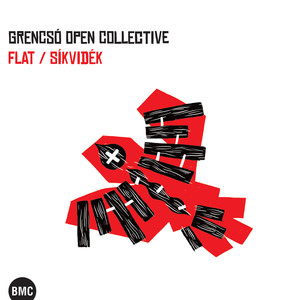
Flat / Síkvidék
- 流派:Jazz 爵士
- 语种:纯音乐
- 发行时间:2015-03-25
- 唱片公司:BMC Records
- 类型:录音室专辑
- 歌曲
- 时长
-
Component 1
简介
The Hungarian-based Open Collective, led by reedist István Grencsó, performs eight originals wedded to the song form. Coming out of a lineage that includes John Coltrane – and by extension Eric Dolphy – Grencsó, who moves among tenor saxophone, flute and bass clarinet, usually operates at fever pitch, often stimulating the performance with a series of empathized slurs and downward stutters. In contrast, there seems to be no despondency in his clarinet playing which relates more closely to melody statements, compared to his sharper extrusions on the saxophone. Flute appears to be his third double and is used for little more than rhythmic peeping. Grencsó’s most characteristic performance on tenor is “Sugar Free/Cukormentes”; while “Ivan's Childhood/Iván gyermekkora” shows off his bass clarinet style to its best advantage. On the former, the saxophonist exhibits a hard and heavy growl, as pianist Máté Pozsár nimbly piles up tremolo notes that relate to McCoy Tyner’s modal playing the way Grencsó’s styling does Trane’s. Together they move the interaction so that it almost hits interstellar space. Pozsár’s contributions to the latter tune build up in stages so that by definition his chording is operating in a zone that could be 21st century boogie-woogie. Accepting the challenge, Grencsó on bass clarinet pumps out chromatically balanced lines that add staccato excitement, then return decisively to conclusively recreate the well-modulated head. Although Grencsó has faced off with rock bands, and proves throughout this CD that he can invest his tenor playing with the toughness of diamond, that doesn’t mean he can’t essay delicate ballads as well. On “In the Csinálósi Forest/Csinálósi erdőn”, a traditional air arranged by the saxophonist and dedicated to the pioneering Hungarian Free Music pianist György Szabados (1939-2011), Grencsó’s textures are low-key and respectful. Utilizing a series of vibrated and slurped notes he ends up with a magisterial solo in “A Love Supreme” mode, as the pianist chords sympathetically and bassist Róbert Benkő provides pulsating stops. Later Benkő’s see-saw arco sweeps propel the performance into higher registers as the sax man splays theme variations at various speeds and modes. (Ken Waxman)

